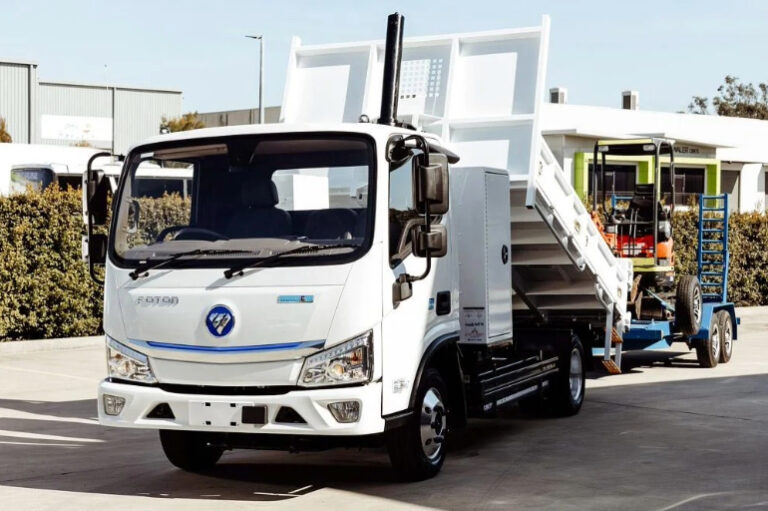Australia’s new truck market is holding up well in 2025 despite headwinds — but fleet buyers are clearly adopting a more cautious approach, both to overall purchasing decisions and the transition to electric trucks.
Bill Gillespie, General Manager – Foton EV and DFAC – Light Duty Trucks, told Fleet News Group that while demand is softer than the record years of 2023 and 2024, the fundamentals remain strong.
“There’s no doubt the market is slower,” Gillespie said. “But you know, I say, what are you comparing it to? If you’re comparing it to last year, or the year before that, or even the year before that, those were times that will most likely not be seen again for quite some time.”
“I think if you’re saying it’s slow compared to that, but if you go back over five or six years — is it really slow compared to that? I don’t think it is. I think it’s still holding up pretty well.”
Buyers adapting to new conditions
Interest rates, higher operating costs, and a more conservative business outlook are all influencing fleet replacement plans.
“Certainly it does feel like people potentially are holding their vehicles maybe a little bit longer than they were before,” Gillespie noted.
He explained that trucks bought during the COVID period often did fewer kilometres than anticipated. “If you’ve got a truck coming off in 2025, you probably took the finance out in 2021. Now, if it’s done less kilometres than it previously did, maybe you don’t need to change it over.”
Some buyers are also weighing the potential impact of future emissions policies on their fleet decisions. “If you’re in 2025 and you took another five-year lease, it takes you up to 2030. If there’s some emissions sort of legislation changes coming, you might be second-guessing that.”
Euro 6 compliance driving some pre-buying
The introduction of Euro 6 emissions standards is having a modest impact on buying patterns, particularly for some brands.
“One particular brand indicated they’re going to have quite a significant price increase on the back of it. And I suspect that they’ve had a big… I know they’ve had quite a rush for people to jump in before the price increases,” Gillespie said.
However, he noted that the broader medium and heavy truck market remains relatively resilient. “When you look at the last few months, light trucks have been down, but medium and heavy seem like they’re still going pretty well.”
Appetite for electric trucks cooling
While Gillespie remains committed to growing the Foton EV truck range — which now includes models up to 18 tonnes — he acknowledged that the market for electric trucks is proving challenging.
“We still see the market as being pretty immature,” he said. “Despite having the best truck for that type of work, it’s still quite a challenge to get Australian companies to make any major changes to the way they operate their fleet.”
A range of factors are at play. Gillespie observed that both government and corporate momentum on fleet decarbonisation has slowed noticeably.
“It does feel like there’s been a shift in the world,” he said. “The EV passenger side has come off a little bit in the last couple of months. And I think in the light truck side there’s no great mandate or pressure or blueprint from government saying you need to reach this level by 2030.”
“These trucks, really, the EV trucks, are really sold to the major, top 100 companies in Australia. And if they’re not really being pressured to do anything, and they don’t have their own internal mandate to do something — if they’re Australian-owned, they probably don’t have a mandate to do anything. If they’re overseas-owned, they may have more pressure on them.”
“But generally, we’re not seeing pressure coming at the market that you need to change over from diesel.”
Policy incentives needed
Gillespie would like to see a more coordinated approach from governments to encourage the uptake of zero-emission trucks.
“At the moment, the only government that’s got any support like that is the New South Wales Government. And I think that concludes on the 5th of June. No other state government’s doing it, and certainly federally, there’s no view that we’ve heard where they’re going to support adoption of zero-emission light duty trucks or even medium duty trucks.”
He argues that simple fiscal incentives could make a meaningful difference. “If you can buy the truck, you can write it off in two years or three years versus a normal write-off — that gives people significant tax benefits.”
“What it signals to the market is, we care about this idea about lowering emissions and we’re prepared to put some support behind it.”
Market resilience the key
Looking ahead, Gillespie remains pragmatic about the truck market’s outlook.
“You’ve got to build a business that can be resilient. Markets are going to come up and down,” he said. “Frankly, I don’t think the Australian economy is as bad as some people are talking about. I think there’s certainly the mortgage belt of Australia doing it harder with interest rates. But I still don’t believe that the Australian market or the Australian economy is in such bad shape.”
“You’ve just got to work harder, that’s all.”






